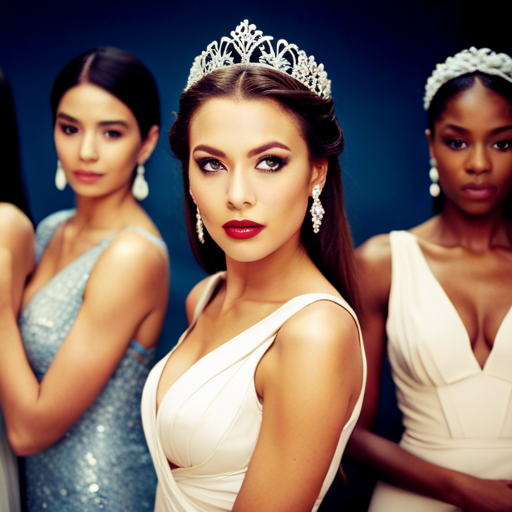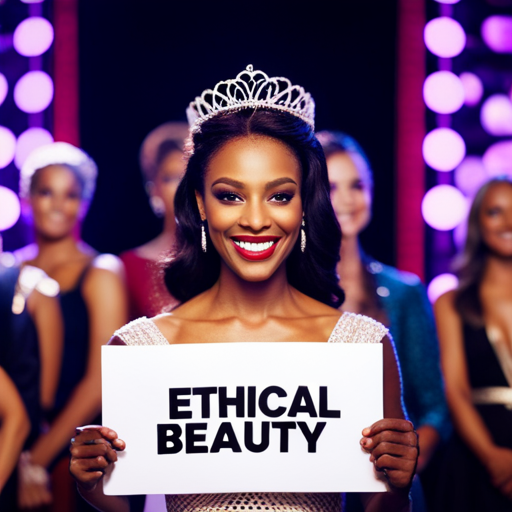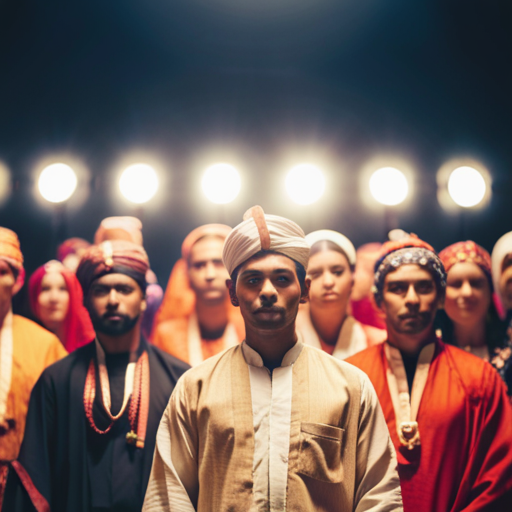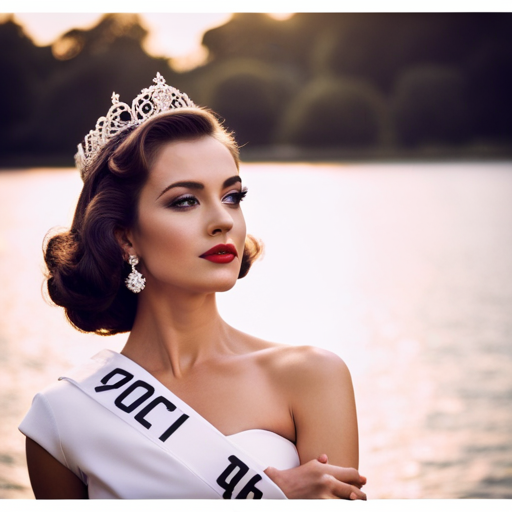The Psychology Behind Pageant Participation

Like the intricate choreography of a flawless performance, the psychology behind pageant participation involves a delicate interplay of motivations, self-esteem, body image, and public speaking.
This article explores the complex emotions and mindset of pageant contestants, shedding light on the psychological impact of competing in these glamorous events.
Delve into the inner workings of the pageant world and gain insight into the intriguing intersection of psychology and beauty pageants.
Motivations for Entering Pageants
Frequently, individuals are motivated to enter pageants by a desire to showcase their talents and gain recognition within the competitive world of beauty and poise. The allure of personal growth and the opportunity to challenge societal pressures also play a significant role in motivating individuals to participate in pageants.
Many contestants see pageants as a platform to develop their self-confidence, public speaking skills, and overall stage presence. The structured nature of pageants, with their emphasis on poise, grace, and beauty, provides a unique avenue for individuals to refine these attributes, leading to personal growth and self-improvement.
Moreover, societal pressures, particularly those related to body image and beauty standards, can be a motivating factor for entering pageants. Many individuals view pageants as a means to challenge these societal norms and redefine beauty on their own terms. By participating in pageants, individuals can defy conventions and showcase diverse forms of beauty, thereby contributing to a broader societal conversation about inclusion and acceptance.
Ultimately, the motivations for entering pageants are multifaceted, encompassing both personal aspirations for growth and a desire to impact societal perceptions of beauty and poise.
Impact of Pageant Competition on Self-Esteem
The impact of pageant competition on self-esteem has been a subject of interest in psychological research, shedding light on the effects of participation in beauty pageants on individuals’ self-perception and confidence. Beauty pageants can have both positive and negative effects on self-esteem. On one hand, participating in pageants can contribute to the development of self-confidence as contestants learn to present themselves in front of an audience and develop public speaking skills. On the other hand, the emphasis on physical appearance in pageants can lead to social comparison, where individuals may perceive themselves as less attractive or less worthy based on the standards set by the competition. This can potentially lower self-esteem and contribute to negative self-perception.
| Positive Effects | Negative Effects |
|---|---|
| Self-confidence development | Social comparison |
| Public speaking skills | Negative self-perception |
The development of self-confidence through pageant participation can be a valuable asset in various aspects of life, but it is essential to address the potential negative impact of social comparison on self-esteem. Psychological support and promoting a healthy self-image are crucial in mitigating the adverse effects of beauty pageants on individuals’ self-esteem.
The Role of Body Image in Pageant Participation
Participating in pageants often places a significant emphasis on body image and its impact on contestants’ overall experience and perception of themselves. This aspect of pageant participation can have a profound effect on the mental and emotional well-being of contestants.
The role of body image in pageants can be further understood through the following points:
-
Body Confidence: Pageant participation often requires contestants to showcase their physical appearance on stage, leading to heightened scrutiny of their bodies. This spotlight can either bolster or diminish a contestant’s body confidence, affecting how they carry themselves both during the competition and in their everyday lives.
-
Societal Pressures: The prevailing societal standards of beauty and body ideals can exert immense pressure on pageant contestants to conform to these norms. This pressure can lead to feelings of inadequacy and self-doubt, impacting their overall self-image and mental well-being.
-
Mental Health Implications: The intense focus on body image in pageants can contribute to mental health challenges such as body dysmorphia, eating disorders, and anxiety. Contestants may grapple with these issues as they navigate the demands of the competition and the expectations placed upon them.
Understanding the complex interplay between body image, societal pressures, and mental well-being is crucial in addressing the holistic impact of pageant participation on individuals.
Psychological Benefits of Public Speaking and Performing
Engagement in public speaking and performing can yield significant psychological benefits for pageant contestants. The act of public speaking itself can serve as a confidence-building exercise. Through the process of preparing and delivering a speech or performance, contestants develop and enhance their communication skills, self-assurance, and poise. Public speaking provides a platform for individuals to articulate their thoughts and ideas, fostering a sense of empowerment and self-efficacy. Additionally, the experience of performing in front of an audience can contribute to overcoming stage fright and anxiety, promoting mental resilience and a positive mindset.
Furthermore, participating in public speaking and performing allows contestants to embrace vulnerability, as they learn to navigate and manage their emotions while under the spotlight. This exposure can lead to increased emotional intelligence and the ability to connect with others on a deeper level. As pageant contestants engage in these activities, they are likely to develop a stronger sense of self-awareness, emotional regulation, and empathy, all of which are essential psychological attributes for navigating the demands of pageant participation.
Emotions and Mindset of Pageant Contestants
During public speaking and performing, pageant contestants cultivate emotional intelligence and mental resilience, which are vital for maintaining a positive mindset and navigating the demands of pageant participation. This involves a range of emotions and challenges that require effective stress management and emotional regulation.
To delve into the emotions and mindset of pageant contestants, it’s essential to consider the following:
-
Stress Management:
-
Pageant contestants often face intense pressure, from rigorous training to public scrutiny. Mastering stress management techniques is crucial for maintaining composure and delivering confident performances.
-
Developing coping strategies such as mindfulness, deep breathing exercises, and visualization can help alleviate anxiety and promote mental clarity amidst the chaos of pageant activities.
-
Emotional Regulation:
-
Embracing emotional regulation enables contestants to navigate the highs and lows of the pageant journey with grace and resilience.
-
Cultivating self-awareness and the ability to channel nervous energy into enthusiasm can enhance emotional regulation, fostering a positive and authentic stage presence.
Frequently Asked Questions
What Are the Financial Costs Associated With Participating in Pageants, and How Do They Impact Contestants?
Participating in pageants incurs substantial financial costs, often including entry fees, wardrobe, coaching, and travel expenses. These financial stresses can have a significant impact on contestants’ mental health, contributing to anxiety and pressure.
How Do Pageants Address and Accommodate Contestants With Disabilities or Health Conditions?
How do pageants address and accommodate contestants with disabilities or health conditions? Inclusion accommodations are crucial to providing support for contestants facing health challenges. Pageants should ensure accessibility, support, and celebrate the diversity of all participants.
Are There Any Long-Term Psychological Effects of Participating in Pageants, Whether Positive or Negative?
Participating in pageants can have long-term psychological effects on individuals, both positive and negative. These impacts can include increased self-confidence and resilience, but also potential issues with body image and self-esteem. It’s important to consider the holistic impact of pageant participation.
How Do Pageants Handle Issues of Diversity and Inclusion, Such as Race, Ethnicity, and Cultural Representation?
Pageants are increasingly focusing on cultural representation and addressing discrimination issues. They strive to promote diversity and inclusion by embracing contestants from various races, ethnicities, and cultural backgrounds. This commitment enhances the overall inclusivity and appeal of pageants.
What Kind of Support Systems or Resources Are Available to Pageant Contestants to Help With the Psychological Pressures of Competition?
Pageant contestants have access to mental health resources, emotional support, and confidence-building programs to manage the psychological pressures of competition. These resources help in stress management and provide a supportive environment for the contestants.
Conclusion
In conclusion, pageant participation offers a platform for individuals to showcase their talents and gain confidence through public speaking and performing.
The experience of competition can impact self-esteem and body image, but also provide psychological benefits. Contestants navigate a range of emotions and develop a determined mindset.
Like a rose blooming amidst thorns, pageant participation can empower individuals to grow and flourish in the face of challenges.





